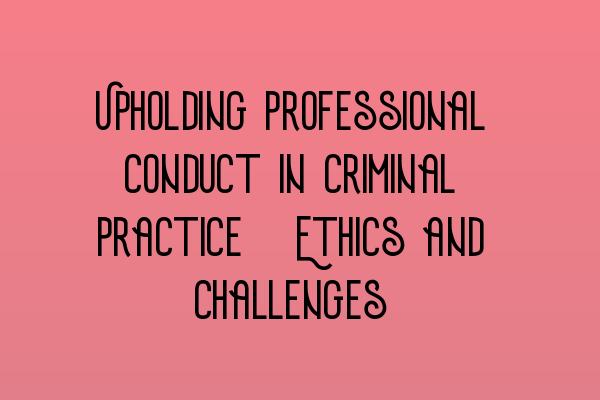Upholding Professional Conduct in Criminal Practice: Ethics and Challenges
As criminal law practitioners, we understand the crucial role professional conduct plays in upholding justice and ensuring the integrity of the legal system. Adhering to ethical standards is not only a requirement but also a responsibility we bear towards our clients, the court, and society as a whole.
In this blog post, we will explore the ethical challenges faced in criminal practice and discuss how to navigate them with integrity.
Ethical Challenges in Criminal Practice
One of the most common ethical challenges faced by criminal practitioners is the duty of zealous advocacy while maintaining a duty to the court and the administration of justice. Striking the right balance can be a delicate task, but it is essential for ensuring a fair trial and upholding the rule of law.
Another prominent challenge is the duty of confidentiality. Clients often confide sensitive information, and it is our responsibility to maintain their trust while also complying with legal obligations, such as disclosure requirements when necessary.
Furthermore, conflicts of interest can arise, especially when representing multiple clients involved in the same criminal matter or when there is a personal or financial relationship that may compromise our duty to act in the best interest of each client.
Navigating Ethical Challenges
To navigate ethical challenges effectively, criminal practitioners must have a solid understanding of legal ethics. Continuous professional development and staying up-to-date with the latest laws, regulations, and professional conduct codes are essential.
Engaging in regular legal training courses, such as the SQE 1 and SQE 2 preparation courses, can help practitioners enhance their knowledge and ensure compliance with ethical standards.
Additionally, seeking guidance and consulting with experienced colleagues or mentors in the field can provide valuable insights into ethical dilemmas and their resolution. Collaboration and discussion within the legal community can contribute to a shared understanding of best ethical practices.
Importance of Upholding Ethical Standards
Upholding ethical standards is not only a professional obligation but also crucial for maintaining the credibility and public trust in the legal profession. Clients rely on us to provide competent and ethical representation, and the court relies on our integrity to ensure a just outcome.
By upholding ethical standards, we contribute to the overall fairness and efficiency of the criminal justice system. It also promotes a positive reputation for both individual practitioners and the legal profession as a whole.
The Way Forward
As criminal lawyers, it is essential to continuously reflect on our ethical decisions and actions. We should strive to uphold professional conduct, regardless of the challenges we may face.
If you are preparing for the SQE exams, we recommend checking out the following related articles for valuable resources:
- SQE 1 Practice Exam Questions
- SQE 1 Practice Mocks FLK1 FLK2
- SQE 2 Preparation Courses
- SQE 1 Preparation Courses
- SRA SQE Exam Dates
Remember, upholding professional conduct and ethics in criminal practice is not only a legal requirement but also a moral responsibility. By doing so, we contribute to the integrity and credibility of the legal profession.
Stay professional, stay ethical!
